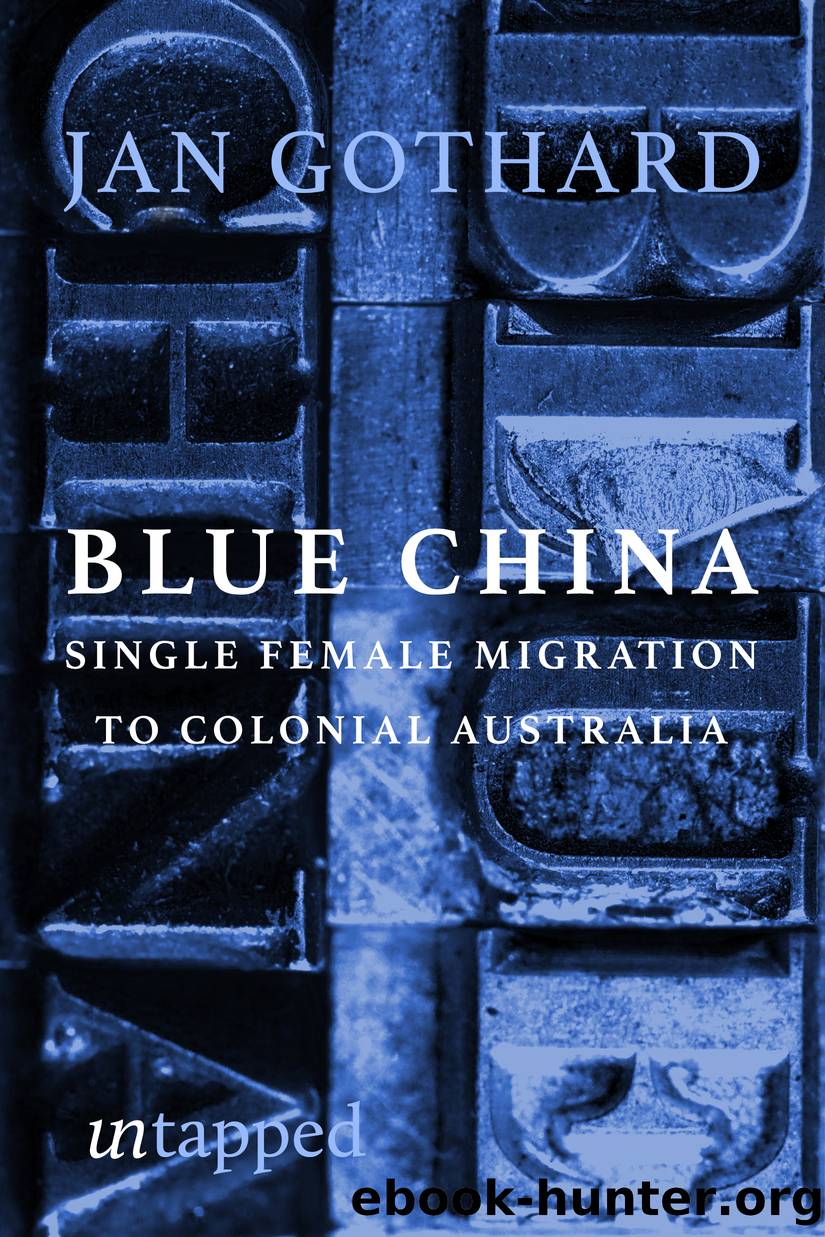Blue China by Jan Gothard

Author:Jan Gothard
Language: eng
Format: epub
Publisher: Ligature Pty Limited
Published: 2021-11-16T11:03:29+00:00
7
A Compromise with Conscience
Arrival in the colony was, after all, the whole point of the emigration exercise. It was far more than just the moment. The rites of that passage, indeed the whole transition from âemigrantâ through âimmigrantâ to âcolonialâ, continued for some time. And like the shipboard passage now complete, the process of arriving was mediated by outsiders: employers; middle-class women in their shifting roles of philanthropists and employers; and colonial government agents. Long after arrival, relations with people such as these continued to affect an immigrantâs experience.
The experience of arrival changed, of course, with time and circumstance. Convict women could anticipate a rowdy welcoming committee of single men, including dock workers and militia, eager to participate in the spectacle of assessing the prospective sexual talent. Later that century, the arrival and the hiring out of single female immigrants still represented something part way between a spectator sport and a meat market. In the 1880s, the wife of the Governor of New South Wales wanted to watch the proceedings when the newly-arrived immigrant women were hired out from the depot, but the immigration officer prevented her. âShe would be shocked by what she would witnessâ, she was told, a rabble of desperate Sydney employers, mostly middle-class and society women, competing for the limited and valuable services of newly-arrived domestics. 466 In Western Australia a decade later, police were employed to escort the arriving single women from the vessel to the depot and, though the wharf was crowded, male onlookers restricted any expression of emotion to âthree cheers for Old England in good deep voiceâ. 467 Yet the Western Mail still described the hiring process at the Fremantle female immigrant depot as ânot altogether an elevating oneâ, with its suggestion of âthe squatter picking out the best workers from a herd of two-year old cattleâ. 468 The scenes had shifted, some of the cast was new, but many aspects of the drama of arrival and reception remained familiar.
Under colonial immigration schemes, the idea was that immigrant women would enter domestic service as soon as possible, an arrangement which equally suited employers seeking servants and colonial governments footing the bill for immigrant board and lodging. Immigrant women were also generally anxious to resume employment after weeks or months without an income although their interests did not always match up with those of colonial governments and employers. Nor did passing out of the governmentâs hands mean an end to government involvement in their lives.
Reception arrangements differed from colony to colony, and from time to time. In some colonies, such as South Australia, or in Queensland from the late 1880s, assisted men and their families were received into an immigrantsâ depot or had accommodation provided after they disembarked. Elsewhere, in New South Wales for instance, they could remain on board the vessel during what was called its âlay daysâ, the time taken for unloading and refitting. This could be anything up to ten days. In most cases, single and married men were responsible for finding their own employment after arrival.
Download
This site does not store any files on its server. We only index and link to content provided by other sites. Please contact the content providers to delete copyright contents if any and email us, we'll remove relevant links or contents immediately.
The Memory Code by Lynne Kelly(2401)
Schindler's Ark by Thomas Keneally(1889)
Kings Cross by Louis Nowra(1798)
Burke and Wills: The triumph and tragedy of Australia's most famous explorers by Peter Fitzsimons(1427)
The Falklands War by Martin Middlebrook(1386)
1914 by Paul Ham(1347)
Code Breakers by Craig Collie(1253)
A Farewell to Ice: A Report from the Arctic by Peter Wadhams(1249)
Paradise in Chains by Diana Preston(1247)
Burke and Wills by Peter FitzSimons(1238)
Watkin Tench's 1788 by Flannery Tim; Tench Watkin;(1232)
The Secret Cold War by John Blaxland(1213)
The Protest Years by John Blaxland(1207)
THE LUMINARIES by Eleanor Catton(1196)
30 Days in Sydney by Peter Carey(1160)
Lucky 666 by Bob Drury & Tom Clavin(1155)
The Lucky Country by Donald Horne(1142)
The Land Before Avocado by Richard Glover(1120)
Not Just Black and White by Lesley Williams(1087)
